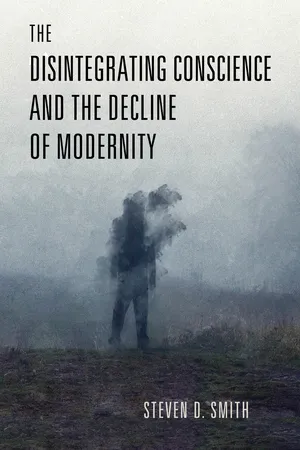
- English
- ePUB (mobile friendly)
- Available on iOS & Android
The Disintegrating Conscience and the Decline of Modernity
About this book
This book considers how the modern concept of "conscience" turns the historic commitment on its head, in a way that underlies the decadence of modern society.
Steven D. Smith's books are always anticipated with great interest by scholars, jurists, and citizens who see his work on foundational questions surrounding law and religion as shaping the debate in profound ways. Now, in The Disintegrating Conscience and the Decline of Modernity, Smith takes as his starting point Jacques Barzun's provocative assertion that "the modern era" is coming to an end. Smith considers the question of decline by focusing on a single theme—conscience—that has been central to much of what has happened in Western politics, law, and religion over the past half-millennium. Rather than attempting to follow that theme step-by-step through five hundred years, the book adopts an episodic and dramatic approach by focusing on three main figures and particularly portentous episodes: first, Thomas More's execution for his conscientious refusal to take an oath mandated by Henry VIII; second, James Madison's contribution to Virginia law in removing the proposed requirement of religious toleration in favor of freedom of conscience; and, third, William Brennan's pledge to separate his religious faith from his performance as a Supreme Court justice. These three episodes, Smith suggests, reflect in microcosm decisive turning points at which Western civilization changed from what it had been in premodern times to what it is today.
A commitment to conscience, Smith argues, has been a central and in some ways defining feature of modern Western civilization, and yet in a crucial sense conscience in the time of Brennan and today has come to mean almost the opposite of what it meant to Thomas More. By scrutinizing these men and episodes, the book seeks to illuminate subtle but transformative changes in the commitment to conscience—changes that helped to bring Thomas More's world to an end and that may also be contributing to the disintegration of (per Barzun) "the modern era."
Frequently asked questions
- Essential is ideal for learners and professionals who enjoy exploring a wide range of subjects. Access the Essential Library with 800,000+ trusted titles and best-sellers across business, personal growth, and the humanities. Includes unlimited reading time and Standard Read Aloud voice.
- Complete: Perfect for advanced learners and researchers needing full, unrestricted access. Unlock 1.4M+ books across hundreds of subjects, including academic and specialized titles. The Complete Plan also includes advanced features like Premium Read Aloud and Research Assistant.
Please note we cannot support devices running on iOS 13 and Android 7 or earlier. Learn more about using the app.
Information
Table of contents
- Cover
- Half Title
- Series Title
- Title
- Copyright
- Dedication
- Contents
- Acknowledgments
- PROLOGUE How Did We Get Here?
- ONE Lost World, New World: Thomas More and His Troublesome Conscience
- TWO Disestablishment and the New Establishment: James Madison and the Gospel of Conscience
- THREE Conscience and Compartmentalization: The Disintegration of William Brennan and of America
- EPILOGUE Looking Backward, Looking Forward
- Notes
- Index